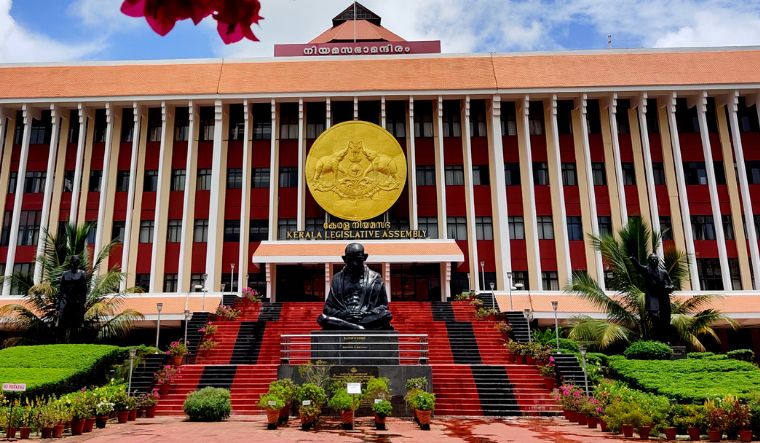The Kerala Legislative Assembly unanimously passed a resolution opposing any attempts by the Union government to implement a Uniform Civil Code (UCC). Kerala is the first state to adopt such a resolution since Prime Minister Narendra Modi rekindled discussions about the UCC in late June. In 2019, the Kerala assembly had passed a resolution calling for the repeal of the Citizenship Amendment Act, too.
The anti-UCC resolution was introduced by Kerala Chief Minister Pinarayi Vijayan. It said that the Kerala Legislative Assembly expresses its "concern and dismay" at the central government's endeavour to "impose" a UCC. It further states that the House believes such unilateral and hurried action by the Central Government could compromise the secular nature of the Constitution.
The resolution noted that Article 44 of the Constitution only proposes that the nation shall strive to realise a UCC. “This maintains that it shall be accomplishable only through consensus and dialogues with various religious groups, over time. However, the central government has now come with an authoritarian move without consulting anyone or without trying to create consensus and this creates apprehensions among various sections of society. The Kerala Legislative Assembly is also expressing its concerns in this regard. Such efforts to impose Uniform Civil Code are communal and it can only be observed as harmful to the unity of the nation,” read Vijayan’s resolution.
Earlier, the ruling CPI(M) and the main opposition Congress had held a series of seminars in Kerala against the implementation of a UCC.
Leader of the opposition, V.D. Satheeshan, commended the willingness of the ruling front to engage with the opposition before presenting the resolution in the assembly. Nevertheless, opposition parties, including the Congress and the Muslim League, expressed dissatisfaction with certain phrasings in the initial resolution put forth by the Chief Minister. For example, the closing paragraph of the initial resolution stated that the Kerala assembly "unanimously urges the Central Government to refrain from any overt actions 'until a consensus on issues' affecting our populace is reached through deliberations with various religious groups."
Muslim League MLAs, including N. Shamsudheen, Manjalamkuzhi Ali, and P. Ubaidulla, contended that there is no need for discussion on UCC in the future, too, and that the resolution should explicitly call on the Union government not to take any steps in this direction. Ubaidulla went on to assert that the notion of a UCC is itself contrary to the Constitution and secular principles.
Congress leader T. Siddique also voiced concern that the concluding paragraph might imply the possibility of implementing a UCC in the future after undergoing discussions.
Meanwhile, Satheeshan also brought attention to an issue within the final paragraph. "While the initial part of the resolution provides a thorough explanation, the concluding paragraph weakens these points," he asserted during the assembly session. He advocated revision of the resolution to explicitly state that the UCC should not be implemented at all, rather than suggesting its implementation contingent on consensus.
"Because the BJP argues that the Law Commission has received a plethora of recommendations from the public and numerous discussions are taking place throughout the state. Our resolution should include elements that firmly reinforce the stance against such arguments," Satheeshan said. "I believe that each one of us shares the same viewpoint, hence the resolution should accurately mirror this collective perspective."
Coincidentally, the ultimate resolution put forth by the chief minister underwent amendments, particularly in the concluding paragraph. It now stipulated that the Union government should refrain from pursuing any actions towards implementing a UCC that could impact the populace nationwide.
N. Shamsudheen had also called for the elimination of the second-to-last paragraph, which contained the following statement: "Ambedkar, who advocated Parliament passing the Uniform Civil Code by respecting citizens' rights to choose their laws, never pressed for one. So, it’s very clear that he was pointing towards a possibility. Common Civil Law was restricted to the scope of the Directive Principle of State Policy due to this opposition."
Shamsudheen argued that interpreting this paragraph could lead to the misconception that Ambedkar endorsed or intended to introduce the UCC. "The confusion arose due to the inadequate translation of Ambedkar's statements from English to Malayalam, which were included in the resolution," he remarked during the assembly session. The final resolution also underwent an amendment for this paragraph, stating that Ambedkar was merely indicating a potential scenario, and this was reflected in the fact that the common civil law was confined within the boundaries of the directive principle of the state policy.



